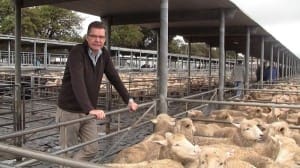MORE sheep producers need to include regular drench efficacy and worm egg testing in their management program to help monitor resistance levels to available chemicals.
It is estimated less than 5 percent of Australian sheep producers do regular drench resistance testing.
Livestock Biosecurity Network regional officer Pat Kluver said the recent discovery of reduced efficacy of the new drenches Zolvix and Startect on different farms in the New England area of NSW has been a wake-up call for the industry.
And a recent survey of major worm and drench testing laboratories found widespread resistance among the common sheep nematodes to all broad spectrum drenches, even potent macrocyclic lactones like moxidectin and abamectin.
“The industry has been using these drenches to control worms in sheep for the past 30 years without a break, and resistance is the inevitable outcome,” he said.
“The risk is it is leading to ‘wormaggeddon’, where drenches become ineffective.”
A small number of cases of resistance to Zolvix were recently confirmed in sheep on two New England farms in regard to Barbers’s Pole worm and for Black Scour worm on the James Cook University farm at Townsville. The two confirmed case of reduced efficacy of Startect (about 90pc effective) against Barber’s Pole worm were in northern NSW and in the Greater Sydney region.
Resistance and survey results point to production losses
Dr Kluver said this news and the results of the laboratory survey should remind producers to use sensible integrated parasite management for worm control, with high levels of resistance to all older drench and their combinations raising the prospect of widespread but hidden production losses.
He was surprised by the high levels of resistance highlighted by the survey, outlined in a recent article published in an Australian Veterinary Journal he co-authored.
The survey showed that worms on 56pc of NSW farms surveyed had resistance to moxidectin and 80pc had resistance to abamectin. Worms on 40pc of farms tested had abamectin-based triple drench resistance.
In Victoria, worms on 40pc of farms surveyed showed resistance to moxidectin and 67pc of farms had resistance to abamectin. All farms surveyed had resistance to the old BZ Lev combinations.
In South Australia, worms on around 50pc of farms surveyed showed resistance to moxidectin and 75pc had abamectin resistance.
In Western Australia, worms on 55pc of farms surveyed had abamectin resistance and 44pc had moxidectin resistance.
Drench resistance testing fundamental to good control
But Dr Kluver said although worm drench resistance generally progresses, it could not be assumed that resistance levels had necessarily increased or improved since the survey.
“But it is a reasonably good indicator; it shouldn’t be taken as gospel and everyone’s resistance status is quite unique to their farm.”
He said all sheep producers should be undertaking regular drench resistance testing, combined with other sensible integrated worm management strategies.
“It is a simple reasonably cheap test and it should be done every 2-3 years.”
NSW Department of Primary Industries state co-ordinator for internal parasites, Stephen Love, said although surveys indicated resistance was very common and very few farmers did regular drench resistance testing, it was a fundamental practice for good worm control to find out what drenches worked.
“Therefore many farmers are unwittingly using ineffective drenches.
“And we also know that the biggest part of the cost of sheep worms is sub-clinical production losses; the really subtle stuff costs them big money.”
Mr Love said he kept encouraging farmers to either do a full resistance test of a DrenchCheck test of worm egg counts 10 days after a routine drench. He said a lack of testing could contribute to increasing drench resistance on farms.
“If you are using a drench that is not highly effective, the resistance goes faster and faster, it builds up momentum.”
Effective quarantine drenching important
Dr Kluver said sheep producers need to stop relying on older classes of drench and integrate new drench classes into their programs, along with bi-annual faecal egg count reduction tests, effective quarantine drenching of newly purchased livestock, within-season rotation of drenches and using older active ingredients in combination where possible.
“The key to good worm control is monitoring resistance when you give drench and through faecal egg count reduction trials every two years.
“Once you know what is working, use effective drenches only when you have to – based on monitoring worm egg counts,” he said.
“When bringing new sheep on to your property, always administer a simple quarantine drench consisting of four different actives, with Zolvix (monapantel) or Startect (derquantel and abamectin) part of that mixture.
“Keep the sheep in the yards for 48-72 hours to empty out and check to make sure the drench has worked by doing worm egg counts on the sheep 10-14 days after you drench them.”
Dr Kluver said the impact of roundworms is the single highest animal health cost to the sheep industry, costing more than $260 million per year.
Drench resistance is a major contributor, causing production losses including reductions in body weight gain, reproductive rates and wool growth, and increased risk of flystrike.
For more information producers can contact their local LBN Regional Officer or check out the www.wormboss.com.au website, which includes drench decision guides.
Read Stephen Love’s WormBoss article on resistance to the new drenches here.
Sources: Livestock Biosecurity Network, NSW DPI.


HAVE YOUR SAY